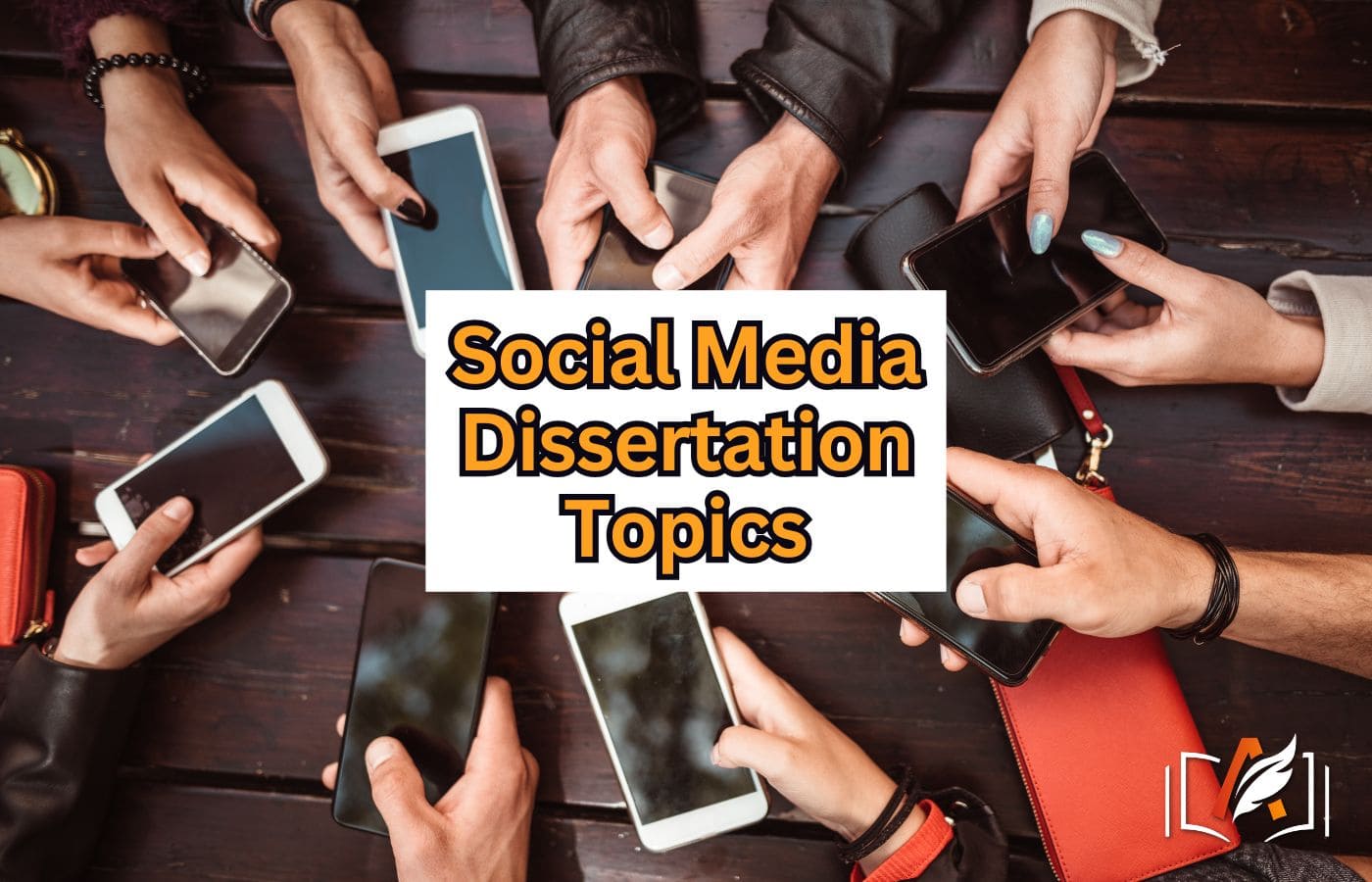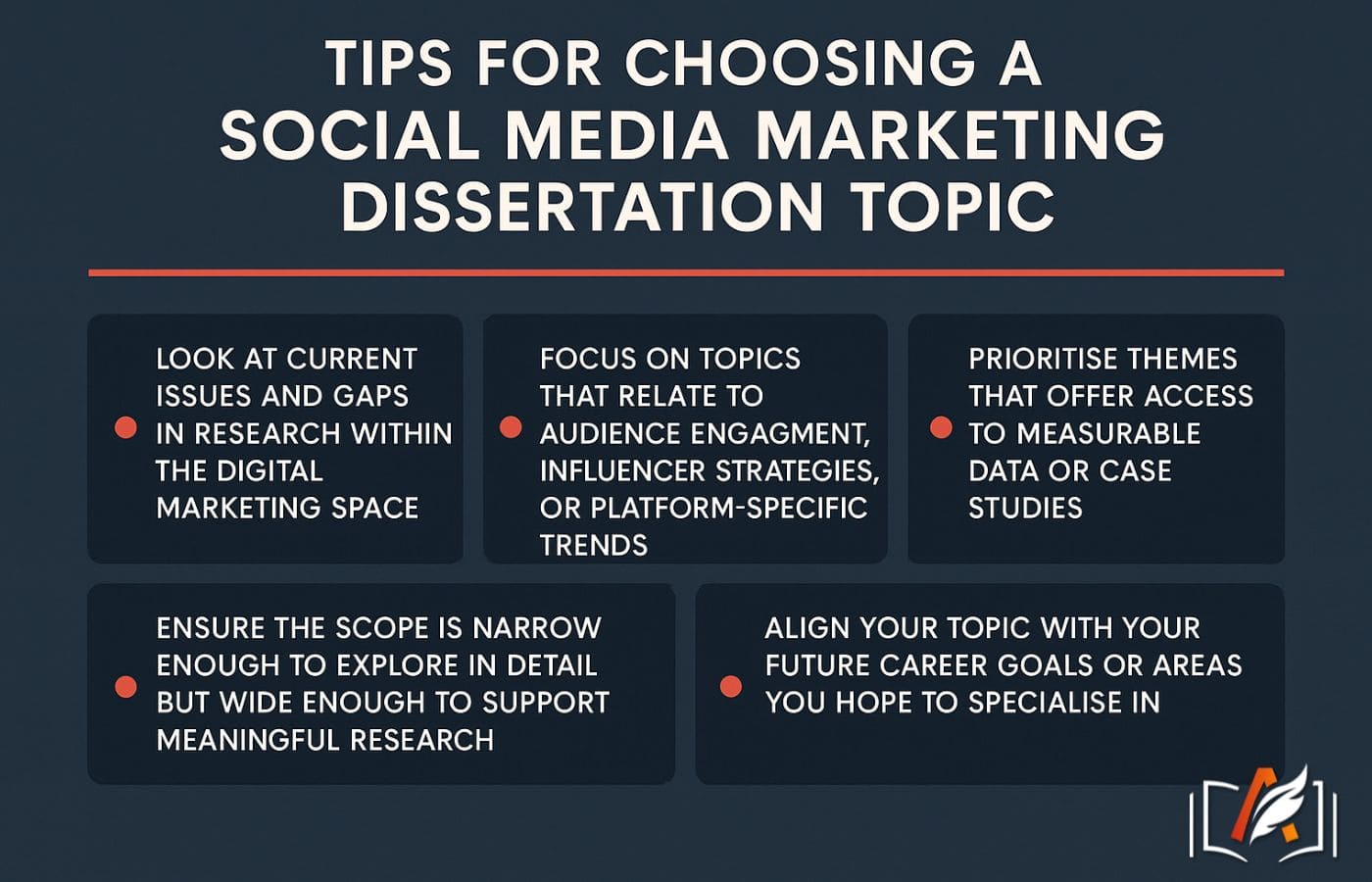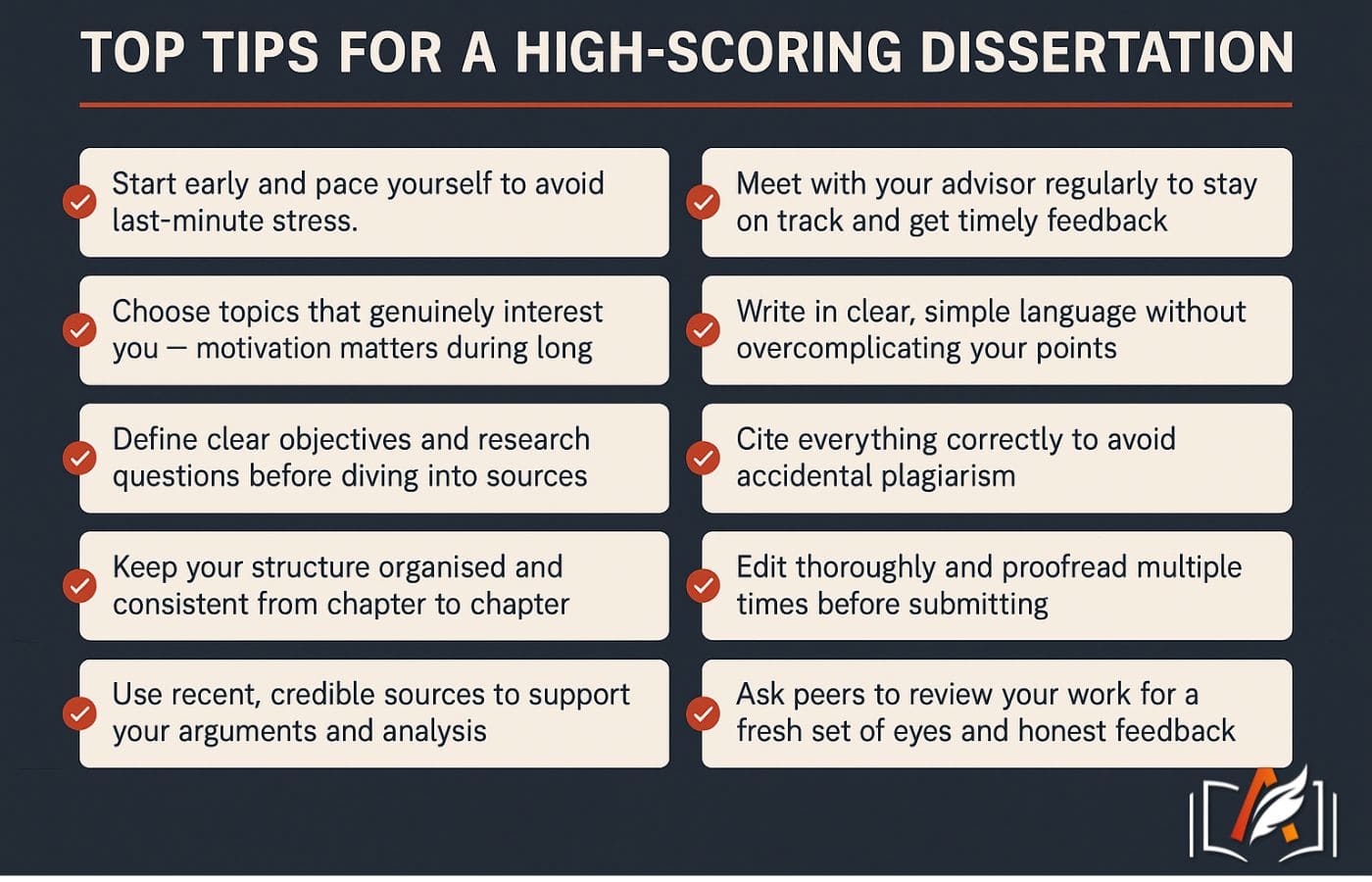 Ruby Butz
Ruby Butz

The right social media dissertation topics form the foundation for a strong and relevant academic project. A good theme reflects current trends and addresses real-world challenges in the evolving digital landscape. With the rapid rise of influencer culture, data privacy concerns, algorithm-driven content, and the impact of social media on mental health and consumer behaviour, students have more meaningful directions than ever before. Here are five trending and impactful dissertation topic examples:
- The Role of TikTok in Shaping Political Opinions Among Gen Z
- Analysing the Influence of Instagram Aesthetics on Brand Loyalty
- Social Media Burnout: Causes, Consequences, and Coping Mechanisms
- The Ethics of AI-Generated Content in Social Media Marketing
- How Social Media Algorithms Impact News Consumption and Public Trust
This article will provide various trending social media dissertation topics and offer practical tips to help you select the one that aligns with your academic goals and industry needs. Let’s dive in!
Innovative Strategies for Picking a Winning Social Media Marketing Dissertation Topic
Well-chosen social media dissertation ideas can make all the difference in shaping a successful research journey. In social media marketing, where trends shift quickly and technology evolves constantly, picking a relevant and manageable subject is key. The topic should match your interests and offer enough depth for serious analysis. These practical tips will guide your decision:
- Look at current issues and gaps in research within the digital marketing space.
- Focus on topics that relate to audience engagement, influencer strategies, or platform-specific trends.
- Prioritise themes that offer access to measurable data or case studies.
- Ensure the scope is narrow enough to explore in detail but wide enough to support meaningful research.
- Align your topic with your future career goals or areas you hope to specialise in.
- While it’s tempting to go after the flashiest trend, staying grounded in a topic you can confidently analyse will help ensure long-term success.

Common Pitfalls to Dodge When Choosing a Research Title
Jumping into dissertation planning without careful thought can lead to frustration. Many students pick topics based on hype, rather than feasibility or relevance. Let’s look at some mistakes to watch out for – and how to avoid them.
- Picking a too broad or vague subject makes it challenging to stay focused. Narrow your topic to a specific angle or question.
- Choosing a theme with limited data or unclear metrics will complicate the research process. Always check data availability early on.
- Avoid trending buzzwords that fade fast unless you tie them to a lasting issue or concept.
- Don’t choose a topic just because it sounds impressive – ensure you understand it well enough to analyse it deeply.
- Ignoring academic sources and relying only on blogs or social platforms weakens the credibility of your argument.
Turning to academic support can make a real difference when narrowing down a topic or being unsure how to shape your research. StateOfWriting’s write my essay service offers expert guidance, helping students refine their ideas, structure their arguments, and produce well-researched content. It’s a practical option for anyone looking to save time and improve the overall quality of their dissertation.
Trending Topics on Social Media and Consumer Behaviour Insights
The connection between social media and consumer behaviour continues to grow, making it a rich area for academic study. From brand perception to purchasing decisions, users are influenced by online content in measurable ways. These social media topics for dissertation reflect what’s happening now in digital spaces – and offer real opportunities for in-depth research.
- How Micro-Influencers Affect Purchasing Behaviour in Gen Z Consumers
- The Role of Social Proof in Shaping Online Buying Decisions
- User-Generated Content and Its Impact on Brand Trust
- Social Media Storytelling and Its Effect on Brand Loyalty
- The Influence of Ephemeral Content (e.g., Stories) on Impulse Buying
- Consumer Reactions to AI-Generated Ads on Social Platforms
- TikTok Trends and Their Effect on Consumer Product Discovery
- Emotional Branding Through Interactive Instagram Features
- The Relationship Between Online Reviews and Consumer Hesitation
- How Live-Streamed Shopping Events Shape Decision-Making in Digital Commerce
Fresh Dissertation Ideas for the Influencer Marketing Space
As influencer marketing continues to reshape how brands connect with audiences, this area has become a popular focus for academic research. It blends elements of digital strategy, consumer psychology, and content creation – all within a fast-moving environment. If you are interested in current issues, this topic area offers a chance to explore real-time trends and measurable outcomes in online marketing.
- The Impact of Authenticity on Follower Engagement in Influencer Campaigns
- How Nano-Influencers Build Niche Brand Communities on Instagram
- The Effectiveness of TikTok Influencer Collaborations in Driving Product Sales
- Comparing the Trust Levels of Paid Influencers vs. Unpaid Brand Advocates
- The Rise of Virtual Influencers: Opportunities and Ethical Challenges
- How Influencer Partnerships Affect Customer Loyalty in the Fashion Sector
- Gen Z’s Perception of Sponsored Content on YouTube
- Cultural Differences in Influencer Marketing: A Cross-Country Study
- The Role of Influencer Content in Shaping Purchasing Decisions During Economic Downturns
- Measuring the ROI of Influencer Campaigns Through Social Listening Tools
Exploring Branding and Audience Loyalty Through Dissertation Research
Branding is significant in how companies communicate values, build trust, and retain customers. Social media platforms give brands direct access to global audiences, so the relationship between branding and digital engagement is more critical than ever. These examples of social media dissertation topics focus on how modern branding influences consumer connection, loyalty, and perception.
- How Interactive Content Strengthens Emotional Connection With a Brand
- The Effect of Consistent Brand Voice Across Social Platforms
- Rebranding in Crisis: Case Studies From the Post-Pandemic Market
- Brand Transparency and Its Influence on Consumer Trust in Gen Z
- The Connection Between Brand Storytelling and Customer Retention
- How Cause-Based Branding Influences User Behaviour on Instagram
- Emotional Branding Strategies and Their Effectiveness in E-Commerce
- The Role of User Experience in Building Brand Perception
- Personal Branding Among Influencers: Where Content Creator Meets Company
- How Community-Building Impacts Brand Advocacy on Niche Platforms
Strategic Angles for Social Media Marketing Dissertation Success
A solid social media marketing strategy is no longer optional – it’s essential. As digital behaviour shifts and platform algorithms evolve, companies are rethinking how they connect, convert, and retain users online. Explore current title ideas connected to marketing strategy through social media.
- How Data-Driven Targeting Improves Ad Campaign Performance
- The Shift Toward Personalised Content in Facebook Marketing Strategies
- Mobile-First Strategies and Their Role in Driving Conversions
- Exploring Platform-Specific Strategy Differences Between B2B and B2C
- The Effectiveness of Time-Based Content Posting in Engagement Outcomes
- The Impact of Algorithm Changes on Organic Content Reach
- Social Media Crisis Response as Part of a Broader Marketing Strategy
- Integrating Customer Feedback Into Content Strategy on LinkedIn
- Multi-Platform Campaign Planning: Pros, Cons, and Challenges
- The Role of AI Tools in Optimising Content Scheduling and Performance
Trending Dissertation Themes on Analytics, Metrics & ROI in Social Media
Knowing whether a marketing campaign is truly working comes down to the numbers. Analytics, metrics, and return on investment (ROI) are major in shaping how social media efforts are planned, measured, and improved. As companies invest more in digital platforms, students exploring topics for social media dissertation projects can uncover how to evaluate performance across industries, tools, and platforms.
- The Effectiveness of Conversion Tracking Tools in Paid Social Campaigns
- How Engagement Metrics Predict Brand Recall on Instagram
- The Role of Click-Through Rate in Evaluating Video Ad Success
- ROI Measurement Techniques in Influencer-Led Brand Promotions
- Evaluating Sentiment Analysis Accuracy in Automated Social Reporting
- Predictive Analytics and Its Influence on Social Campaign Forecasting
- The Impact of Bounce Rate on Paid Traffic Strategies Across Social Channels
- KPI Alignment Between B2B Marketing Teams and Social Media Goals
- How Real-Time Analytics Shape Brand Response During Online Crises
- Comparing Attribution Models Used in Multichannel Social Media Campaigns
Platform-Focused Social Media Dissertation Ideas for Deep-Dive Studies
Every social platform has its own set of rules, audience behaviours, and algorithm quirks. Studying a specific channel allows detailed exploration of features, user trends, and marketing opportunities. Whether it’s TikTok's short-form content or LinkedIn's professional tone, when a study is tightly focused, there's plenty to examine.
- User Interaction Patterns and Content Visibility on LinkedIn
- Instagram Reels vs. TikTok: Comparing Reach and Engagement Rates
- How Facebook Groups Support Niche Community Marketing
- Twitter Threads as Tools for Long-Form Storytelling in Brand Campaigns
- The Effectiveness of Branded Filters and Lenses on Snapchat
- How Algorithm Changes on YouTube Impact Content Creator Visibility
- Consumer Trust and Product Reviews in Pinterest Shopping Features
- WhatsApp Business Integration and Its Effect on Customer Communication
- User-Generated Content Trends Within Brand Hashtags on TikTok
- Facebook Marketplace and Its Influence on Peer-to-Peer Brand Engagement
Ethical, Privacy, and Policy-Based Dissertation Topics in the Digital Space
Social media ethics and regulations have become more critical than ever, with data breaches, targeted ads, and algorithmic manipulation regularly in the headlines. For students interested in privacy, law, or tech accountability, dissertation topics in social media in this area offer a chance to research some of the most pressing issues in digital communication.
- The Balance Between Personalisation and Intrusion in Targeted Advertising
- Ethical Challenges in AI-Generated Influencer Content
- User Consent and Data Transparency Across Social Media Platforms
- Algorithmic Bias and Its Impact on Content Visibility in Marginalised Communities
- Regulation of Political Content and Advertising on Social Media
- Cross-Border Data Privacy Laws and Their Implications for Global Platforms
- The Role of Whistleblowers in Revealing Unethical Platform Practices
- How Cookie Policy Changes Affect Social Media Advertising Strategies
- Children’s Data Protection on Apps With Social Sharing Features
- The Ethics of Deepfake Technology in Social Video Content
Read also: Top Politics Dissertation Topics
Current Dissertation Titles on Fake News, Misinformation & Public Trust
In today’s information-heavy world, false content can spread fast, especially across social media platforms. Misinformation influences opinions and fuels division, distrust, and confusion in society. Students researching this space can explore how digital channels contribute to public misunderstanding and the systems used to detect and manage false narratives. Here is a list of social media dissertation topics related to misinformation and public perception:
- The Impact of Fake News on Voter Behaviour During Election Campaigns
- How Social Media Algorithms Amplify Political Misinformation
- Fact-Checking Effectiveness in Reducing the Spread of False Content
- The Role of Influencers in Spreading or Correcting Health-Related Misinformation
- Digital Literacy and Its Role in Combating Fake News Among Young Adults
- Public Trust in News Shared Through Personal Social Networks
- How Deepfake Videos Alter Public Understanding of Real Events
- The Effect of Misinformation on Vaccine Hesitancy and Health Decisions
- Comparing Platform Responses to Misinformation: Twitter vs. Facebook
- The Role of Satirical News in Shaping Beliefs and Spreading Falsehoods
Read also: Current Social Work Dissertation Topics Worth Exploring
Fresh Ideas for Exploring the Social Role of Digital Platforms
Social media has become more than just a communication tool – it now shapes culture, identity, and social change. From movements like #MeToo to debates about privacy and cancel culture, these platforms play a key role in how people connect and express themselves. This section offers social media dissertation topic ideas for students looking to investigate the social impact of digital platforms.
- The Influence of Social Media on Modern Protest Movements
- How Online Communities Reinforce Cultural Identity in Diaspora Groups
- Social Media’s Role in Promoting or Preventing Cancel Culture
- Digital Activism and Its Effectiveness in Driving Real-World Change
- The Impact of Public Shaming on Reputation in Online Spaces
- How Social Platforms Have Transformed Political Participation Among Youth
- Gender Representation and Stereotyping in Instagram Content
- The Role of Memes in Shaping Social Commentary and Public Opinion
- Social Media and the Reinforcement of Echo Chambers
- Parental Influencers and the Ethics of Sharing Children's Lives Online
New Directions in Research on Social Media and Mental Health
The link between online activity and mental health has sparked wide concern and growing interest. From digital burnout to social comparison, users face challenges that weren’t as visible before the rise of these platforms. This list is designed to help learners explore how social tools impact emotional well-being, self-perception, and psychological health.
- The Relationship Between Instagram Use and Body Image Dissatisfaction
- How Social Comparison on TikTok Affects Teen Self-Esteem
- The Effects of Digital Detox Challenges on Emotional Well-Being
- Online Validation and Its Influence on Self-Worth in Young Adults
- Anxiety Linked to Fear of Missing Out (FOMO) From Social Feeds
- How Cyberbullying on Snapchat Impacts Adolescent Mental Health
- The Role of Influencer Content in Shaping Emotional Resilience
- Nighttime Social Media Use and Its Effects on Sleep Quality
- The Connection Between Comment Moderation and User Stress Levels
- How Algorithmic Feeds Contribute to Mood Swings and Digital Overwhelm
Innovative Ways to Approach Social Media Dissertation Research
Before writing begins, one of the most important decisions is how to collect and analyse data. The method you choose will shape the direction of your entire project. It’s not about picking the most straightforward path but matching the proper method to your research question. Each option offers different benefits, depending on whether you're looking at user behaviour, campaign performance, or content strategy. These research methods work well for dissertation topics about social media:
- Quantitative Surveys – Ideal for collecting numerical data on user behaviour or attitudes across platforms.
- Content Analysis – Helps uncover patterns or themes in posts, hashtags, or comments.
- Interviews – Offers personal insights and detailed opinions from individuals such as marketers or users.
- Focus Groups – Useful for understanding how groups respond to campaigns or features.
- Case Studies – Allows deep dives into the strategy and outcomes of a specific brand or campaign.
- Ethnographic Observation – Explores real-time user behaviour within online communities.
- Sentiment Analysis – Analyse users' feelings about a topic through post language.
- Web Analytics Tools – Tracks data like reach, engagement, and conversions on digital platforms.
- Longitudinal Studies – Measures changes in user habits or brand performance over time.
- Experimental Methods – Test different content types or formats to observe which gets better results.
For students who feel overwhelmed by the research process or unsure where to begin, using a website to buy a dissertation in UK can be a practical solution. It connects students with professional academic writers who understand university standards and can help produce well-structured, original work. Whether you need help with a specific chapter or a complete dissertation, this support can save time, reduce stress, and improve your chances of academic success.

Top Tips to Help You Nail a High-Scoring Dissertation
An excellent dissertation is more than just a lengthy report. It reflects how well a student can research, think critically, and present ideas clearly and logically. Every step matters – from narrowing down your topic to formatting your final submission. Based on years of academic support, we’ve gathered helpful advice that can push your dissertation from average to outstanding. Here are our expert-backed tips for a standout dissertation:
- Start early and pace yourself to avoid last-minute stress.
- Choose social media-related dissertation topics that genuinely interest you – motivation matters during long projects.
- Define clear objectives and research questions before diving into sources.
- Keep your structure organised and consistent from chapter to chapter.
- Use recent, credible sources to support your arguments and analysis.
- Meet with your advisor regularly to stay on track and get timely feedback.
- Write in clear, simple language without overcomplicating your points.
- Cite everything correctly to avoid accidental plagiarism.
- Edit thoroughly and proofread multiple times before submitting.
- Ask peers to review your work for a fresh set of eyes and honest feedback.
What I Discovered While Writing My Dissertation
Writing my dissertation was one of the most challenging and rewarding parts. I researched how Instagram stories shape user engagement for small lifestyle brands. It started with excitement, dipped into frustration, and eventually turned into a final product I was genuinely proud of.
One of the most important lessons I learned was the value of detailed planning. I underestimated how long research takes, especially when collecting original data. Building a timeline saved me. Another lesson was staying flexible. My initial idea had to shift halfway through once I saw that the data wasn’t heading in the direction I expected. Being open to change helped the final version become stronger.
Treat any student working on a dissertation like a process, not a test. You don’t need to get everything right on the first try. Progress matters more than perfection – with the proper support, you’ll get there.
This comprehensive guide explores how to choose effective research topics in social media, highlighting current trends like influencer marketing, mental health, branding, and digital ethics. It offers practical tips, research method suggestions, and detailed topic ideas to help students align their academic work with real-world issues. The article provides essential advice for writing a high-quality dissertation, from avoiding common pitfalls to using tools like sentiment analysis and web analytics. Personal insights from the author and recommendations for academic support services round out this valuable resource for students at any stage of their research journey.

Meet Ruby Butz, the accomplished author at the StateOfWriting educational blog. With a Master’s in English Literature, notable articles, and extensive teaching experience, she has helped thousands of students develop strong writing skills.
Writers are verified and tested to comply with quality standards.
Work is completed in time and delivered before deadline.
Wide range of subjects and topics of any difficulty covered.
Client id #: 000410
Paper type: CourseworkAll was completed just as I wanted. Excellent support - Big thanks to all of you 🙏🤗
Client id #: 000398
Paper type: Research paperFrom my experience, StateOfWriting excels in quality and service. My paper was well-researched, unique, and expertly written. Many thanks!
Client id #: 000402
Paper type: Research paperI found this service online, ordered the research, and within eight hours I had my paper ready. And the price was great - thank you!